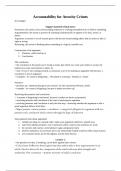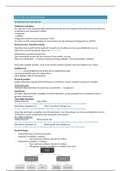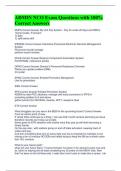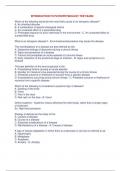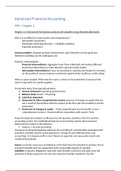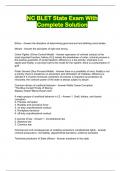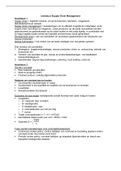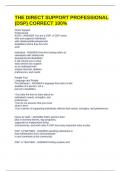Physical Applications – EPA – Patrick de Bock Loranne den Otter
Electrophysical agents
Introduction
1. What are electrophysical agents
= a medical treatment that uses some kind of electrically generated energy in order to obtain a
physiological effect in the body
▪ it implies that this energy is able to cause some kind of positive physical reaction in the body
▪ there is a wide variety of positive physical reactions caused by the EPAs
▪ this physical reaction is the final goal for the therapist as it is a way to treat or cure the
disease
▪ the way of using the physical reaction can be
– forcing the body to a change
as well as
– tickling the body to use its own properties to change
In other words, EPAs are:
▪ those modalities that administer electrical, mechanical, thermal, electromagnetic or light
energy to the patient in order to provide physiological effects and therapeutic benefits
▪ They are primarily used in physiotherapy practice as an adjunct to other treatment and
management techniques
1.1. Terminologie
▪ Electrophysical agents
– ≈ electrophysical modalities
– ≈ physical applications
– ≈ electrotherapy
– considered synonymous terms by some therapists, but strictly speaking,
electrotherapy should properly be reserved for the specific application of electrical
energy (= electric currents) to the tissues
▪ We’ll use the abbreviation EPAs
– term in use since the International Society for Electrophysical Agents in Physical
Therapy (ISEAPT) was founded in 2009
1.2. Various types
▪ transcranial direct current stimulation
▪ short wave diathermy
▪ pain decreasing currents
▪ muscle stimulating currents
▪ percutaneous electrolysis
▪ electro acupuncture
▪ iontophoresis
▪ laser
▪ therapeutic ultrasound
▪ cranial electro stimulation
▪ transcranial alternating current stimulation
▪ shockwaves
▪ tecar
▪ deep oscillation therapy
,Physical Applications – EPA – Patrick de Bock Loranne den Otter
2. Before you can start (Self-study module 1)
2.1. Physics of the EPAs – Basic concepts
Coulomb
▪ Unit of electric charge
▪ Coulomb (C)
▪ 1C = +- 6,24 x 10^18 electrons
Voltage (V) = Difference in electric voltage
▪ Nodig om electrons te verplaatsen
▪ SI unit: Volt
▪ 1 Volt = 1 Joule per coulumb
▪ Outlet/socket = 230 Volt
Current
▪ Electron movement from one place to another
▪ SI unit: ampere
▪ 1A = one coulomb per second
▪ # of amperes ~ # of electric charges (E-) move through a conductor per second
▪ 1A = rather big current, clinical practice = currents of several mA
▪ Direction = important
=> Voltage
,Physical Applications – EPA – Patrick de Bock Loranne den Otter
Direct current Alternating current
- Electrons flow in one direction - Electrons alternate directions
- ~ Flow of water in a river - ~ Tide of the sea
- E.g. Laptops, mobile phone - E.g; Mixer, ventilator
▪ Conventional current flow : + → -
▪ Electron current: - → +
▪ Anode = positive electrode (enter)
▪ Cathode = negative electrode (exit)
, Physical Applications – EPA – Patrick de Bock Loranne den Otter
Resistance (R)
▪ Measure of opposition to current flow in an electric circuit
▪ SI unit: Ohm ()
▪ Typically in the order of k
▪ Conductor
– Conducts electric current
– Low R
– Lichaam, koper, goed, staal…
▪ Resistor/insulator
– Does not conduct electric current
– High R
– Hout, water, rubber, diamant,…
▪ R is afhankelijk van
– Material type
– Length conductor
– Cross-sectional area
– Temperature
Series circuit Parallel circuit
▪ Rtot = R1 + R2 + R3 ▪ 1/Rtot = 1/R1 + 1/R2 + 1/R3
▪ I tot = I 1 = I 2 = I 3 ▪ I tot = I 1 + I 2 + I 3
▪ Vtot = V1 + V2 + V3 ▪ Vtot = V1 = V2 = V3
▪ Total body resistance
– Rbody = RInternal body + (2*Rskin)
o RInternal body = +/- 300
o Rskin = +/- 10k
• Contact surface
• Skin condition (skin damage, sweat,…)
Formules Ohm’s law
▪ V= I*R
▪ I = V/R
▪ R = V/I
▪ Human body = Non-ohmic conductor
Electrophysical agents
Introduction
1. What are electrophysical agents
= a medical treatment that uses some kind of electrically generated energy in order to obtain a
physiological effect in the body
▪ it implies that this energy is able to cause some kind of positive physical reaction in the body
▪ there is a wide variety of positive physical reactions caused by the EPAs
▪ this physical reaction is the final goal for the therapist as it is a way to treat or cure the
disease
▪ the way of using the physical reaction can be
– forcing the body to a change
as well as
– tickling the body to use its own properties to change
In other words, EPAs are:
▪ those modalities that administer electrical, mechanical, thermal, electromagnetic or light
energy to the patient in order to provide physiological effects and therapeutic benefits
▪ They are primarily used in physiotherapy practice as an adjunct to other treatment and
management techniques
1.1. Terminologie
▪ Electrophysical agents
– ≈ electrophysical modalities
– ≈ physical applications
– ≈ electrotherapy
– considered synonymous terms by some therapists, but strictly speaking,
electrotherapy should properly be reserved for the specific application of electrical
energy (= electric currents) to the tissues
▪ We’ll use the abbreviation EPAs
– term in use since the International Society for Electrophysical Agents in Physical
Therapy (ISEAPT) was founded in 2009
1.2. Various types
▪ transcranial direct current stimulation
▪ short wave diathermy
▪ pain decreasing currents
▪ muscle stimulating currents
▪ percutaneous electrolysis
▪ electro acupuncture
▪ iontophoresis
▪ laser
▪ therapeutic ultrasound
▪ cranial electro stimulation
▪ transcranial alternating current stimulation
▪ shockwaves
▪ tecar
▪ deep oscillation therapy
,Physical Applications – EPA – Patrick de Bock Loranne den Otter
2. Before you can start (Self-study module 1)
2.1. Physics of the EPAs – Basic concepts
Coulomb
▪ Unit of electric charge
▪ Coulomb (C)
▪ 1C = +- 6,24 x 10^18 electrons
Voltage (V) = Difference in electric voltage
▪ Nodig om electrons te verplaatsen
▪ SI unit: Volt
▪ 1 Volt = 1 Joule per coulumb
▪ Outlet/socket = 230 Volt
Current
▪ Electron movement from one place to another
▪ SI unit: ampere
▪ 1A = one coulomb per second
▪ # of amperes ~ # of electric charges (E-) move through a conductor per second
▪ 1A = rather big current, clinical practice = currents of several mA
▪ Direction = important
=> Voltage
,Physical Applications – EPA – Patrick de Bock Loranne den Otter
Direct current Alternating current
- Electrons flow in one direction - Electrons alternate directions
- ~ Flow of water in a river - ~ Tide of the sea
- E.g. Laptops, mobile phone - E.g; Mixer, ventilator
▪ Conventional current flow : + → -
▪ Electron current: - → +
▪ Anode = positive electrode (enter)
▪ Cathode = negative electrode (exit)
, Physical Applications – EPA – Patrick de Bock Loranne den Otter
Resistance (R)
▪ Measure of opposition to current flow in an electric circuit
▪ SI unit: Ohm ()
▪ Typically in the order of k
▪ Conductor
– Conducts electric current
– Low R
– Lichaam, koper, goed, staal…
▪ Resistor/insulator
– Does not conduct electric current
– High R
– Hout, water, rubber, diamant,…
▪ R is afhankelijk van
– Material type
– Length conductor
– Cross-sectional area
– Temperature
Series circuit Parallel circuit
▪ Rtot = R1 + R2 + R3 ▪ 1/Rtot = 1/R1 + 1/R2 + 1/R3
▪ I tot = I 1 = I 2 = I 3 ▪ I tot = I 1 + I 2 + I 3
▪ Vtot = V1 + V2 + V3 ▪ Vtot = V1 = V2 = V3
▪ Total body resistance
– Rbody = RInternal body + (2*Rskin)
o RInternal body = +/- 300
o Rskin = +/- 10k
• Contact surface
• Skin condition (skin damage, sweat,…)
Formules Ohm’s law
▪ V= I*R
▪ I = V/R
▪ R = V/I
▪ Human body = Non-ohmic conductor


